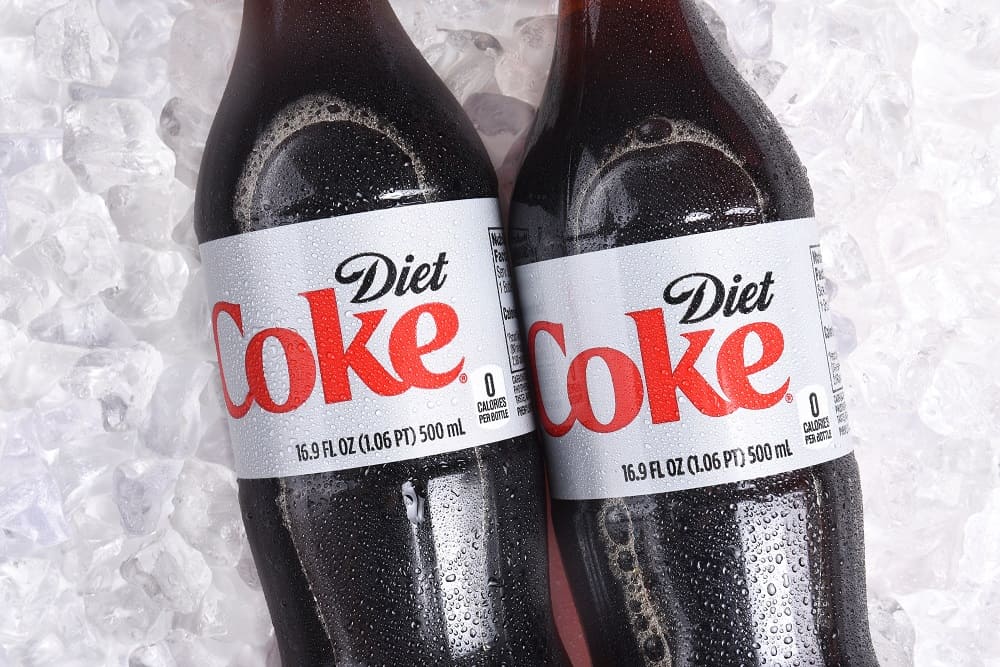Due to the alarming rise in diabetes and obesity associated with increased intake of sugars, many companies have begun producing “sugar-free” versions of their products. Hence, the Coca-Cola company produced Diet Coke – a sugar-free no-calorie soft drink. Instead of sugar, the beverage uses artificial sweeteners. However, many people remain skeptical about drinks such as Diet Coke, particularly whether they are vegan and if they are safe for consumption.
Based on the ingredients list of Diet Coke, the beverage is technically vegan as it does not contain any obvious animal product or derivative. However, upon reviewing the ingredients list, there might be some ingredients that vegans might be worried about. For one, Diet Coke contains natural flavors which remains a gray area in the vegan community. Furthermore, some vegans avoid aspartame because it is an artificial sweetener that has undergone animal testing.
Table of Contents
Is Diet Coke Vegan?

Diet Coke can be considered suitable for dietary vegans. The ingredients list does not include any obvious animal product or derivative. The official website of Coca-Cola Great Britain specifically states:
“The vast majority of our drinks, including Coca‑Cola, are suitable for vegetarians and vegans as they do not contain any animal derivatives (1).”
The products that the website confirms to contain animal derivatives include Lilt, Lilt Zero, Kia-Ora Orange Squash No Added Sugar, Schweppes Indian Tonic Water, Schweppes Orange Squash, Honest (Lemon and Honey), Glaceau Vitaminwater Zero Sunshine and Multi V, Costa Coffee Ready-to-Drink Caramel Latte, Costa Coffee Ready-to-Drink Latte, and Costa Coffee Ready-to-Drink Americano.
The website states that their non-vegan beverages include animal-derived ingredients such as honey, milk, and fish gelatin.
However, some vegans might consider Diet Coke to be non-vegan because it contains an ingredient that has been studied using animal models. While Diet Coke can be considered dietarily vegan, it cannot be considered ethically vegan due to aspartame.
Diet Coke Ingredients List
The list of ingredients in Diet Coke includes (2): Carbonated water, caramel color, aspartame, phosphoric acid, potassium benzoate (to protect taste), natural flavors, citric acid, and caffeine.
The ingredients list also include the warning “phenylketonurics: contains phenylalanine.”
Based on these ingredients, Diet Coke is technically vegan as no animal product or derivative is included. However, there are some ingredients that might warrant a discussion.
For one, the ingredient listed as natural flavors is a common gray area for vegans.
Furthermore, vegans might wonder about caramel color as a food coloring additive. Aspartame is also a problematic ingredient because it has undergone animal testing to evaluate its safety.
Natural Flavors
Natural flavors are a common ingredient found in many food products. However, vegans find this ingredient to be problematic because of the vague definition the FDA describes it as. Specifically, the FDA defines natural flavors as:
“The essential oil, oleoresin, essence or extractive, protein hydrolysate, distillate, or any product of roasting, heating or enzymolysis, which contains the flavoring constituents derived from a spice, fruit or fruit juice, vegetable or vegetable juice, edible yeast, herb, bark, bud, root, leaf or similar plant material, meat, seafood, poultry, eggs, dairy products, or fermentation products thereof, whose significant function in food is flavoring rather than nutritional (3).”
FDA
Due to the vague definition, there is no way to determine whether a product that contains natural flavors is vegan or not just by looking at the label or packaging.
Caramel Color
Caramel color is a common food color additive used in a wide array of food and beverages such as pastries, beers, and sodas. It is typically produced by heating simple sugars with other simple ingredients such as salts in a process called caramelization.
Food coloring agents are very controversial among the vegan community. There are certain food coloring additives that are directly derived from animals such as carmine – a dye derived from cochineal insects.
Synthetic food color additives such as Red 40 and Blue 1 are also problematic. Although they are produced synthetically without the use of any animal derivatives, they remain avoided in the vegan community as these substances undergo a multitude of animal testing studies.
However, caramel color is perfectly suitable for vegans as no animal products are used in its production. As a food coloring additive, caramel color is exempt from FDA certification which means it does not require animal testing studies to evaluate its safety (4).
Aspartame

Aspartame is a common artificial sweetener used by products to substitute sugar. Specifically, the substance is estimated to be 200 times sweeter than table sugar and is known by several trade names such as NutraSweet, Equal, and Canderel.
There are certain issues associated with aspartame. First, many people regarding the safety of consuming artificial sweeteners like aspartame.
Aspartame has the approval from the FDA for use in a wide selection of products including chewing gum, breakfast cereals, beverages, instant coffee and tea, gelatins, puddings, fillings, and dairy products. It is also approved for use in carbonated beverages and carbonated beverage syrup bases (5).
However, scientists warn that people should be wary about the amount of phenylalanine (as warned in the label as well). People with a rare hereditary condition called phenylketonuria have a difficult time metabolizing phenylalanine. Other than this, aspartame is generally recognized as safe.
The next issue that aspartame is associated with is the fact that aspartame has undergone animal testing. For the evaluation of the safety of aspartame for general consumption, many animals have been used for safety testing. Animals used in these studies include rats, mice, dogs, and rabbits (6).
Since aspartame has undergone animal testing, it cannot be considered ethically vegan because animal lives were involved. Animal testing is specifically deemed to be unethical by the vegan community because animals used are usually experimented on until they die.
While such testing methods may have been necessary before, animal testing is not considered necessary today due to the availability of other testing methods. Substitutes for animal testing include the use of cell models instead of animal models and in silico studies (i.e., the use of computer models and algorithms).
References
1. https://www.coca-cola.co.uk/
3. https://www.accessdata.fda.gov/




